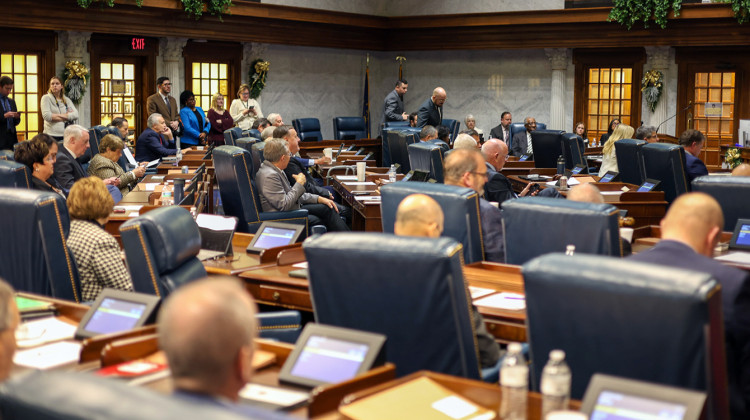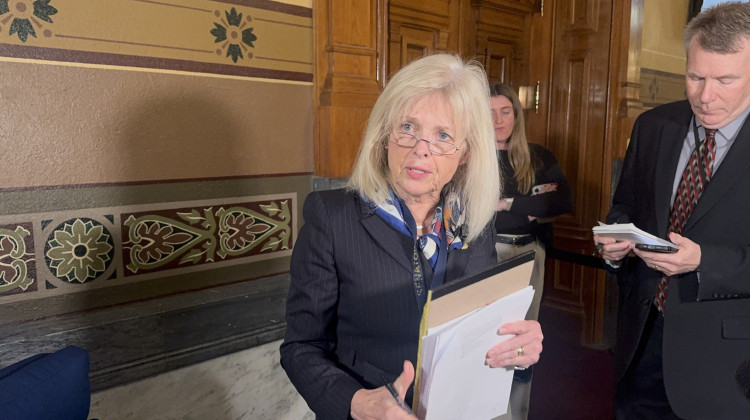Part 3 in a series.
As we continue our series on young activists, we meet Tyshara Loynes, a college student working to protect a street with historic significance for Indianapolis's Black community. Side Effects Public Media’s Darian Benson interviewed her as part of an audio diary project for America Amplified.
Transcript
I'm Tyshara Loynes. I'm a senior at the University of Indianapolis.
I've just helped to organize some protests, some vigils this past summer. Recently, I've kind of started talking with the Get Indiana Ave Back Coalition. Just true community service and activism and what that looks like for Indianapolis and for Gen Z.
So, I was born here in Indianapolis. When I was younger, I actually moved to Georgia. And I lived in Georgia, all the way up until about middle school, like seventh or eighth grade, and we moved back here. I think when I lived in Georgia, I was just used to seeing like, Black people everywhere, literally, in every aspect, like Black judges, and HBCUs, and Black police officers. Like, that was something that was normal to me.
I never feel like there's an actual space for Black people here. You know, a lot of neighborhoods have been gentrified in Indianapolis. I like the Indiana Ave campaign because it sheds a lot of light not only on what Indiana Avenue used to be, but also just shedding light on gentrification happening all over the city, which is important to like, know, and realize, because it's not just happening at Indiana Ave , it's happening all over.
A lot of people, a lot of times they're not aware of what Indiana Avenue was. I was not aware maybe until a couple years ago that the Walker Theater was there. I completely forgot that Madam C.J. Walker moved here from St. Louis. That was something that, it, completely left from my mind. She came here because this is where all the Black entrepreneurs were.
You don't see that, you don’t see a bunch of Black entrepreneurs on Indiana Ave, you see white college students. Nothing that would indicate that Black people were ever there and ever occupying that space.
And so, that is what the protests are about is to just give that information to the people. So we can decide what we want to do with this. We don't want to sit on it because it's hurting us. It's hurting our families, it's hurting our neighborhood. It's hurting the community we built. It is disenfranchising the people who have lived there for 50 plus years, and we can't let that continue. So, what are we going to do?
We can't erase the past. But what we can do is try and vote for pieces of legislation and try and put into perspective for people that this is not how things are supposed to be.
Even if you just think to myself, ‘Oh, hey, I don't like policy. I don't really like politics.’ Okay, well just think, is this right? Or is this wrong? If it's wrong, we need to vote in someone who is going to change it to make it right.
This is the first presidential election I've ever been able to vote in. So, I'm nervous about it. I want people to get out and vote, I want people to go to the polls. So I'm definitely watching policy, about hate crimes, police brutality bills, I’m looking at stuff with climate change. Health care, especially at this time, health care is always a big one.
There's never no work to be done. And so, I think that's what we have to learn with democracy. It's not just a one and done thing. It is a process. It takes time. It takes voting, it takes your voice being heard. It is going to be hard sometimes. It's not an easy thing.”
Behind This Story
Darian Benson produced this story Side Effects Public Media as part of the America Amplified: Election 2020 initiative, using community engagement to inform and strengthen local, regional and national journalism. America Amplified is a public media initiative funded by the Corporation for Public Broadcasting. You can follow America Amplified on Twitter @amplified2020.
Read more about what Darian learned in this Q&A:
Q: What did the people you talked to say about the experience of being interviewed for public radio? Each of the four people I interviewed for this project was excited to share their story for public radio. This project focused on younger adults, pretty much every source agreed that this was a demographic not usually represented in public media.
Q: What surprised you about this type of community engagement? I was surprised by how open they were and how willing to share their lived experiences. All of the interviews were done through Zoom, so I worried that a video call would make it more difficult for sources to get comfortable and open up. However, that was not a problem and they were very eager to share.
Q: Do you plan to go back to this group for more conversations? When and how? I do hope to go back to this group for more conversations, hopefully after the election at some point. I think it would be interesting to do a follow up conversation on Zoom, maybe even in person pandemic-permitting.
 DONATE
DONATE









 Support WFYI. We can't do it without you.
Support WFYI. We can't do it without you.